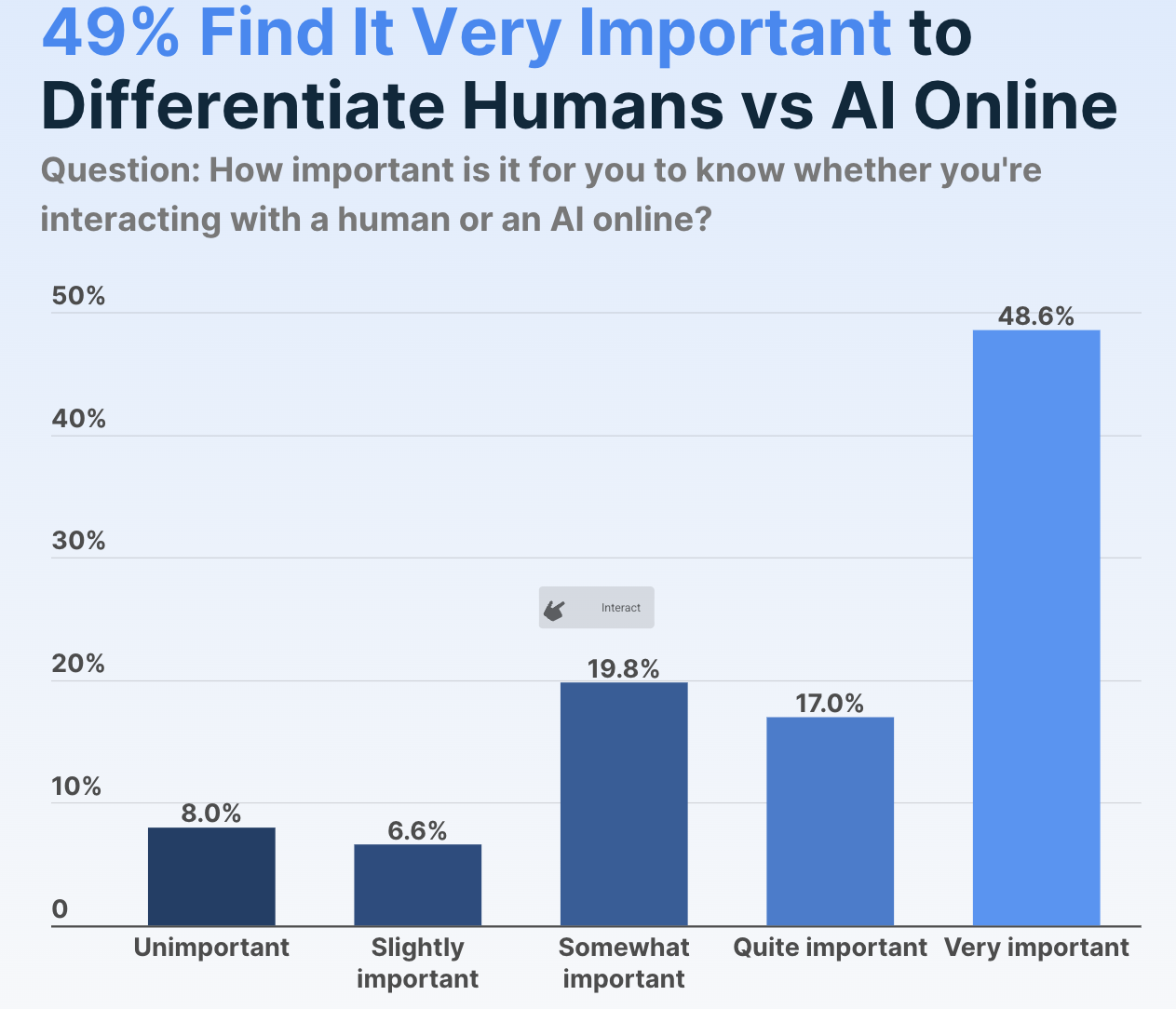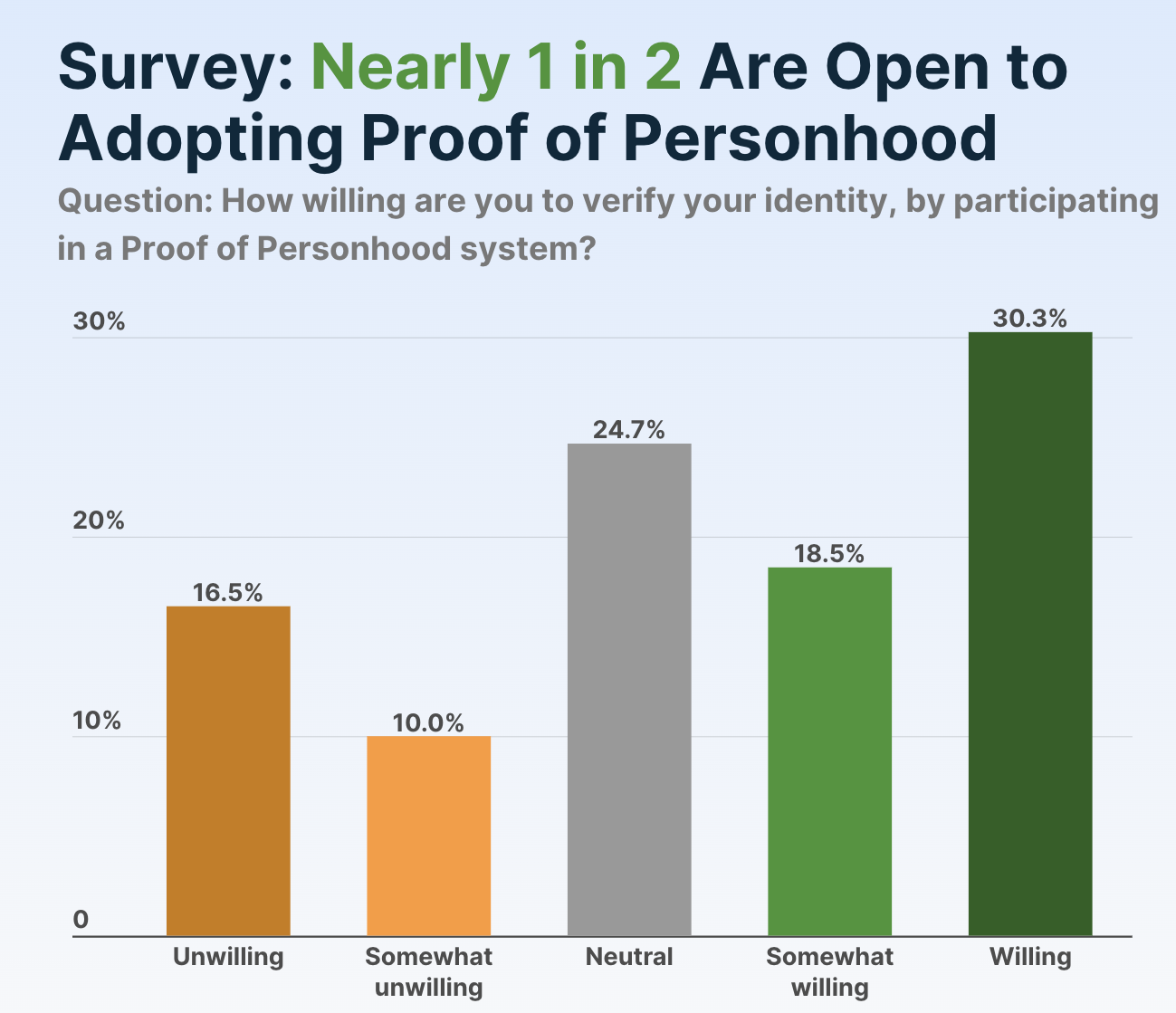Recently, CoinGecko carried out a survey focusing on the views of AI users regarding Proof of Personhood (PoP). A large number of respondents expressed a desire for human-AI differentiation and showed receptiveness towards implementing PoP.
The concept of Proof of Personhood (PoP) serves to authenticate that a user is an individual human – distinct from automated systems like bots, artificial intelligence, or multiple identities. As technology advances and more AI and autonomous entities emerge on digital networks, the need for PoP becomes increasingly important in the eyes of many users.
Is Personhood the Next Big Trend in AI?
Over the recent months, I’ve noticed a dip in enthusiasm surrounding AI projects, a trend that can be primarily attributed to broader economic issues and prevailing narratives shaping the Web3 realm. Despite this downturn in popularity, the development of AI agents continues to thrive.
AI agents have become deeply involved in crypto-related discussions on Twitter and other social media platforms. They are sparking debates, influencing perspectives, and even initiating conversations. As a result, the idea of artificial intelligence being granted ‘personhood’ has emerged as a significant topic within the cryptocurrency community.
Most recently, CoinGecko conducted a survey on AI-related opinions and identifying personhood.

According to CoinGecko’s findings, the majority of AI users place great emphasis on determining whether their interaction is with a human or not. Around half of the respondents consider this matter as “very important,” while 92% believe it holds some level of importance.
The lasting appeal of Proof of Personhood (PoP), initially introduced by Sam Altman’s Worldcoin, within the realm of AI can be attributed to its continued relevance.
It’s clear that AI users desire to establish personhood, but it doesn’t automatically imply that all individuals are ready to embrace Personhood-as-a-Service (PoP) approaches in their current form or concept.
Approximately half of the users expressed a readiness or openness to give them a try, yet this figure pales in comparison to the response for the other query.

In addition, the study found that approximately 30.3% of participants consider it extremely crucial to differentiate between humans and artificial intelligence, and they are open to implementing Proof of Personhood practices.
Conversely, approximately 18.3% considered human identification important yet remained indifferent or actively resisted Pop.
About 18.3% felt that identifying humans was significant, but they either didn’t care much or were against Pop.
Lastly: Approximately 18.3% believed human identification was crucial, but they held a neutral or negative stance towards Pop.
The survey seemingly failed to outline particular Proof-of-Personality (PoP) procedures from any specific project. PoP typically employs unconventional means of verification, like biometric information, social media accounts, or other complex-to-counterfeit methods, but there’s currently no universally accepted standard in the industry.
Given that a recent CoinGecko survey suggested a decrease in AI investment enthusiasm, the difference in opinions on this matter might pose a challenge. While there appears to be general agreement among AI users about the problem at hand, the potential solutions seem to be quite contentious.
Overly aggressive handling of the issue of AI’s capacity for personhood might deter users, which isn’t great considering the present market conditions.
While it’s true that only about half of AI users are keen on adopting Proof of Personhood, it’s worth noting that the number of those expressing strong opposition was relatively limited compared to the overall user base. In other words, the level of controversy surrounding this topic might be overstated.
A significant group of individuals might be undecided, but they could be open to embracing fresh strategies, advertising efforts, or attractive deals.
It’s clear that Proof of Participation (PoP) is emerging as a significant topic within the Web3 community. As more autonomy is granted to agents, PoP could potentially act as a barrier, separating digital interference from genuine engagement.
Read More
- PI PREDICTION. PI cryptocurrency
- Gold Rate Forecast
- Rick and Morty Season 8: Release Date SHOCK!
- Discover Ryan Gosling & Emma Stone’s Hidden Movie Trilogy You Never Knew About!
- We Loved Both of These Classic Sci-Fi Films (But They’re Pretty Much the Same Movie)
- Mission: Impossible 8 Reveals Shocking Truth But Leaves Fans with Unanswered Questions!
- SteelSeries reveals new Arctis Nova 3 Wireless headset series for Xbox, PlayStation, Nintendo Switch, and PC
- Discover the New Psion Subclasses in D&D’s Latest Unearthed Arcana!
- Linkin Park Albums in Order: Full Tracklists and Secrets Revealed
- Masters Toronto 2025: Everything You Need to Know
2025-04-15 02:49